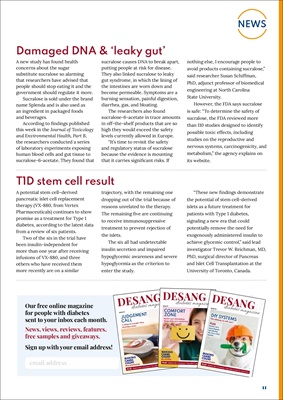
11
NEWS
Damaged DNA & 'leaky gut'
A new study has found health
concerns about the sugar
substitute sucralose so alarming
that researchers have advised that
people should stop eating it and the
government should regulate it more.
Sucralose is sold under the brand
name Splenda and is also used as
an ingredient in packaged foods
and beverages.
According to findings published
this week in the Journal of Toxicology
and Environmental Health, Part B,
the researchers conducted a series
of laboratory experiments exposing
human blood cells and gut tissue to
sucralose-6-acetate. They found that
sucralose causes DNA to break apart,
putting people at risk for disease.
They also linked sucralose to leaky
gut syndrome, in which the lining of
the intestines are worn down and
become permeable. Symptoms are a
burning sensation, painful digestion,
diarrhea, gas, and bloating.
The researchers also found
sucralose-6-acetate in trace amounts
in off-the-shelf products that are so
high they would exceed the safety
levels currently allowed in Europe.
"It's time to revisit the safety
and regulatory status of sucralose
because the evidence is mounting
that it carries significant risks. If
nothing else, I encourage people to
avoid products containing sucralose,"
said researcher Susan Schiffman,
PhD, adjunct professor of biomedical
engineering at North Carolina
State University.
However, the FDA says sucralose
is safe: "To determine the safety of
sucralose, the FDA reviewed more
than 110 studies designed to identify
possible toxic effects, including
studies on the reproductive and
nervous systems, carcinogenicity, and
metabolism," the agency explains on
its website.
T1D stem cell result
A potential stem cell-derived
pancreatic islet cell replacement
therapy (VX-880, from Vertex
Pharmaceuticals) continues to show
promise as a treatment for Type 1
diabetes, according to the latest data
from a review of six patients.
Two of the six in the trial have
been insulin-independent for
more than one year after receiving
infusions of VX-880, and three
others who have received them
more recently are on a similar
trajectory, with the remaining one
dropping out of the trial because of
reasons unrelated to the therapy.
The remaining five are continuing
to receive immunosuppressive
treatment to prevent rejection of
the islets.
The six all had undetectable
insulin secretion and impaired
hypoglycemic awareness and severe
hypoglycemia as the criterion to
enter the study.
"These new findings demonstrate
the potential of stem cell-derived
islets as a future treatment for
patients with Type 1 diabetes,
signaling a new era that could
potentially remove the need for
exogenously administered insulin to
achieve glycemic control," said lead
investigator Trevor W. Reichman, MD,
PhD, surgical director of Pancreas
and Islet Cell Transplantation at the
University of Toronto, Canada.
Our free online magazine
for people with diabetes
sent to your inbox each month.
News, views, reviews, features,
free samples and giveaways.
Sign up with your email address!
ISSUE 115
MAKING
CARBS
COUNT
MILK ALTERNATIVES
PLUS Diabetes kit • Giveaways • News (for T1 and T2) • Food News
JUDGEMENT
CALL
10 things to consider when
choosing a meter
PLUS
Who's Zooming who?
An update on digital
health delivery
ISSUE 111
MAKING
CARBS
COUNT
BELL PEPPERS
PLUS Diabetes kit • Giveaways • News (for T1 and T2) • Food News
COMFORT
ZONE
Roche's new micropump:
designed for user satisfaction
PLUS
Dexcom's next
generation G7 sensor ISSUE 119
MAKING
CARBS
COUNT
LUSCIOUS LYCHEES
PLUS Diabetes kit • Giveaways • News (for T1 and T2) • Food News
DIY SYSTEMS
The ultimate in self-care?
PLUS
Roche's new
meter launch:
introducing
the Accu-Chek
Instant
email address